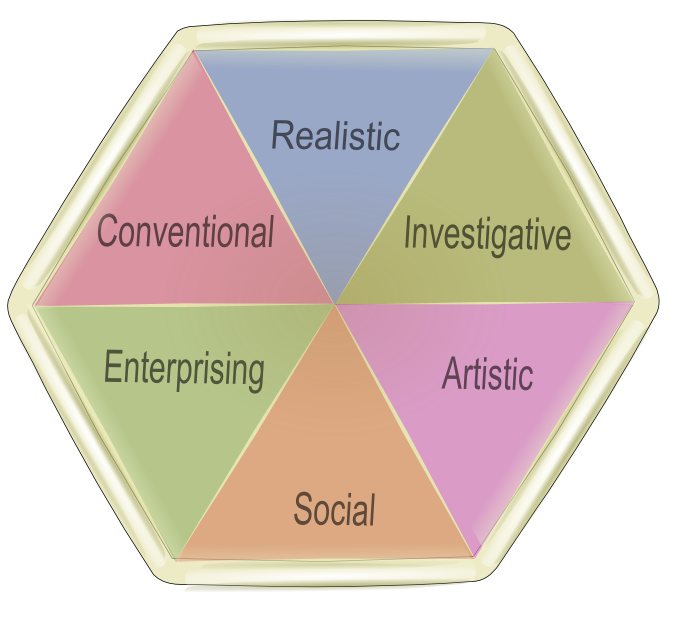
What is RIASEC Assessment?
Content
RIASEC assessment is type of personality assessment used to help individuals identify their career interests and strengths. Based on theory from John Holland, a renowned psychologist, this type of assessment is based on the premise that people perform best in environments that align with their level on six personality factors: Realistic, Investigative, Artistic, Social, Enterprising, and Conventional (RIASEC). Additionally, like the Big Five Personality Traits model, the RIASEC model provides valuable insights by linking personality dimensions with career preferences.
The U.S. Department of Labor’s O*NET system, a comprehensive career database used by millions annually, integrates the RIASEC framework to categorize over 900 occupations. Through tools like the Interest Profiler, it helps users match their interests to relevant career paths, enhancing personalized career exploration.
In this blog post, we’ll dive deeper into what RIASEC assessment is, how it works, and why it’s useful for career planning.
Understanding the RIASEC Model
The RIASEC model is structured around six personality factors:
- Realistic: People who enjoy working with their hands, using tools, and engaging in physical activity. Careers in engineering, construction, or athletics are typical for this type.
- Investigative: Individuals who are analytical, curious, and enjoy solving complex problems. These people often thrive in science, research, and technical fields.
- Artistic: Creative thinkers who express themselves through art, music, writing, or design. These individuals prefer jobs in the creative industries.
- Social: Compassionate and helpful individuals who are drawn to teaching, counseling, or healthcare. Social types enjoy working with others and making a positive impact.
- Enterprising: These people are confident, persuasive, and like to lead. They often excel in business, sales, or management roles.
- Conventional: Detail-oriented individuals who enjoy structure and organization. Jobs in accounting, administration, or data management typically attract this type.
You can find more in-depth descriptions of the RIASEC personality types on trusted career exploration platforms like O*Net Online’s Interest Profiler here.
How the RIASEC Assessment Works
Taking a RIASEC assessment typically involves answering a series of questions that measure your preferences for different types of work activities. These questions might ask how much you enjoy tasks like solving math problems, drawing, or managing a project. Based on your responses, the test assigns you a score in each of the six categories. The higher your score in a category, the more likely that personality type fits you.
The results usually highlight your top three RIASEC codes, which are referred to as your Holland Code. This combination helps to suggest career paths or work environments that align with your preferences and strengths.
Example items:
- Realistic:
- I enjoy building things with my hands
- I prefer a job where I am physically active
- Investigative:
- I would enjoy a job where I need to think hard every day
- I like crossword puzzles and mind teasers
- Artistic:
- I enjoy making my own art
- I like to create infographics
- Social:
- I would like a job where I can make a personal impact on people
- I like to help people
- Enterprising:
- People tend to follow me
- I would enjoy a job where I talk to people a lot
- Conventional:
- I like to perform tasks where there is a clear right answer
- I would like a job where there are a lot of numerical calculations
Why Take a RIASEC Assessment?
The RIASEC assessment is valuable for people of all ages. Whether you’re a high school student exploring future career options or a professional considering a career change, the RIASEC model can help clarify which fields best align with your personality. Understanding your Holland Code provides direction on potential job satisfaction, helping to avoid career mismatches that might lead to dissatisfaction or burnout.
Sites like Truity offer free RIASEC assessments that give immediate feedback. They can provide useful insights even if you’re in the early stages of career planning.
Applying Your Results
 Once you’ve taken the RIASEC assessment, it’s important to use your results thoughtfully. Review your top three personality types and start exploring careers that align with those interests. Many resources, like the U.S. Department of Labor’s CareerOneStop, offer tools to match your RIASEC profile with specific career options.
Once you’ve taken the RIASEC assessment, it’s important to use your results thoughtfully. Review your top three personality types and start exploring careers that align with those interests. Many resources, like the U.S. Department of Labor’s CareerOneStop, offer tools to match your RIASEC profile with specific career options.
You should also consider combining your RIASEC results with other career planning tools, such as skill assessments or personality tests like the Myers-Briggs Type Indicator (MBTI). Doing so can provide a fuller picture of how your interests and abilities overlap. Make sure you use assessments that have predictive validity.
In some cases, a career counselor at your university or other professional might help you interpret results, recommend professions for you to consider, and then help you select an educational pathway to achieve your goals.
Conclusion
The RIASEC assessment is a useful and widely recognized tool for identifying careers that align with your personality and interests. By understanding the six personality types and discovering where your preferences lie, you can make more informed decisions about your career path. Whether you’re just starting out or making a mid-career switch, this assessment provides valuable guidance for finding a job that suits you best.
Nathan Thompson, PhD
Latest posts by Nathan Thompson, PhD (see all)
- Situational Judgment Tests: Higher Fidelity in Pre-Employment Testing - November 30, 2024
- What is an Assessment-Based Certificate? - October 12, 2024
- What is Psychometrics? How does it improve assessment? - October 12, 2024

